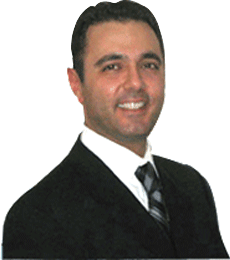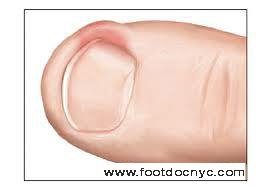Athlete's Foot - Tinea Pedis
By Isaac Tabari
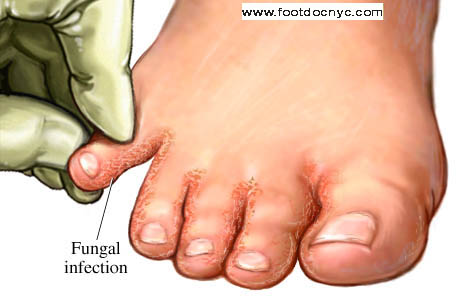
What is athlete's foot?
Athlete's foot, referred to as tinea pedis by podiatrists, is a common fungal infection of the skin of your feet. The fungus, tinea pedis, is caused by dermatophyte and is contracted from public environments. The fungus then grows in the warm and moist environments such as shoes, socks, locker room floors, public swimming pools, and pedicure tubs. It can be difficult to eradicate.
Where did I get a athlete's foot from?
Many cases of athlete's foot can be traced to use of a public recreational facility, such as a spa, swimming pool, or locker room shower. The fungus, which grows in warm, moist environments, likes to live in the outer layers of your skin. However, for short periods of time, the fungus can live in warm puddles on the tile floor, awaiting another foot to hop onto. Athlete's foot can be transmitted to the skin through a cut or abrasion on the bottom of the foot.
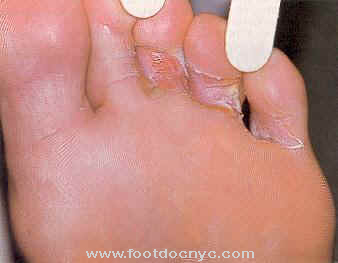
What are the symptoms of athlete's foot?
Most commonly, people experience these typical symptoms of athlete's foot:
- Itching, most notably in the creases between your toes
- Redness and scaling of the skin in affected areas
- Cracked or blistered skin.
Symptoms of athlete's foot can be mild or severe. In more progressed stages of fungal infection, the toenails may become involved causing a thickened, yellowish appearance of the nail. Untreated or severe tinea pedis could lead to painful fissuring or cracking of skin and blistering with surrounding inflammation. It can also lead to chronic fungal nails.
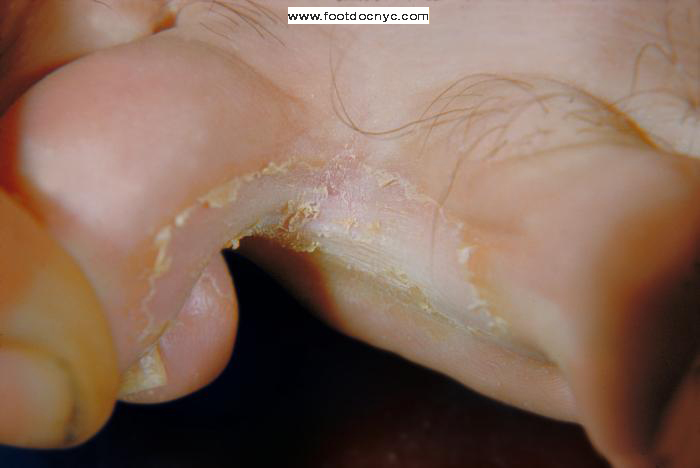
How can I get rid of athlete's foot?
athlete's foot NYC foot doctors podiatristsDiagnosis of athlete's foot can be made by your NYC foot doctor by a clinical exam, microscopic evaluation of scrapings, growing out the fungal cultures from the skin scrapings, and also examining the foot under ultraviolet light. The best treatment for athlete's foot, is prevention. If you're reading this, it is likely that this particular step of treatment has either been passed, or has not worked--keep reading! Once you do get rid of athlete's foot, you're going to want to know how to prevent it from happening again in the future.
- Wear sandals in the locker room.
- Wear cotton socks, and change them often. Once you're done sweating, clean off and put on a fresh pair. If you're shoes are wet or sweaty, make sure you dry them before lacing up again.
- Wash your feet and dry them well. Fungi from athlete's foot will live in a warm, moist environment. Application of a talc powder can help keep your feet dry over the course of the day.
In addition to the above recommendations, your NYC podiatrist / foot doctor will give you medication for athlete's foot and you have to be diligent about applying the medication. You'll have to do this for at least several weeks, twice a day, for athlete's foot treatment to be effective.
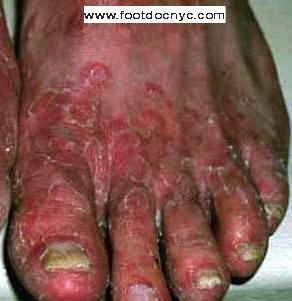
Do I need to see a foot doctor about athlete's foot?
If you can't seem to win the battle against athlete's foot, then it's probably time to visit your doctor. There are further treatment steps that can be taken. If the topical antifungal treatments are not sufficient to control the problem, then an oral prescription treatment is often the next step. There are quite a few antifungal medications on the market, your doctor will help you decide which is best. Fortunately, some of the newer medications have minimal side-effects and are less expensive, but because of possible complications all of the oral antifungals are available only by prescription.
Are there any other issues I should be concerned about if I have athlete's foot?
Athlete's foot is extremely common, and in almost all cases there is no underlying problem that led to your contracting this infection. However, fungal infections can also be an early sign of more serious problems that result in a weakened immune system. This is especially true for individuals who are at risk for developing diabetes or contracting the HIV virus. If someone in your family has diabetes, or if you are at-risk for HIV (high-risk sexual activity, needle sharing), then you should see your doctor to confirm that these are not potential underlying disorders.
***This material is only provided as helpful information and not as medical advice and you should consult with your foot doctor for a professional diagnosis. ***
For more information on athlete's foot treatments and to make an appointment with the NYC Athlete's Foot Podiatrist Foot Doctor, please call our office today (212) 288-3137 or click here to make an appointment.
***This material is only provided as helpful information and not as medical advice and you should consult with your foot doctor or another medical doctor for a professional diagnosis. ***
For more information on foot and ankle podiatry services and to make an appointment with best NYC podiatrist - foot doctor, please call us at (212) 288-3137 or click below to make an appointment:

|






